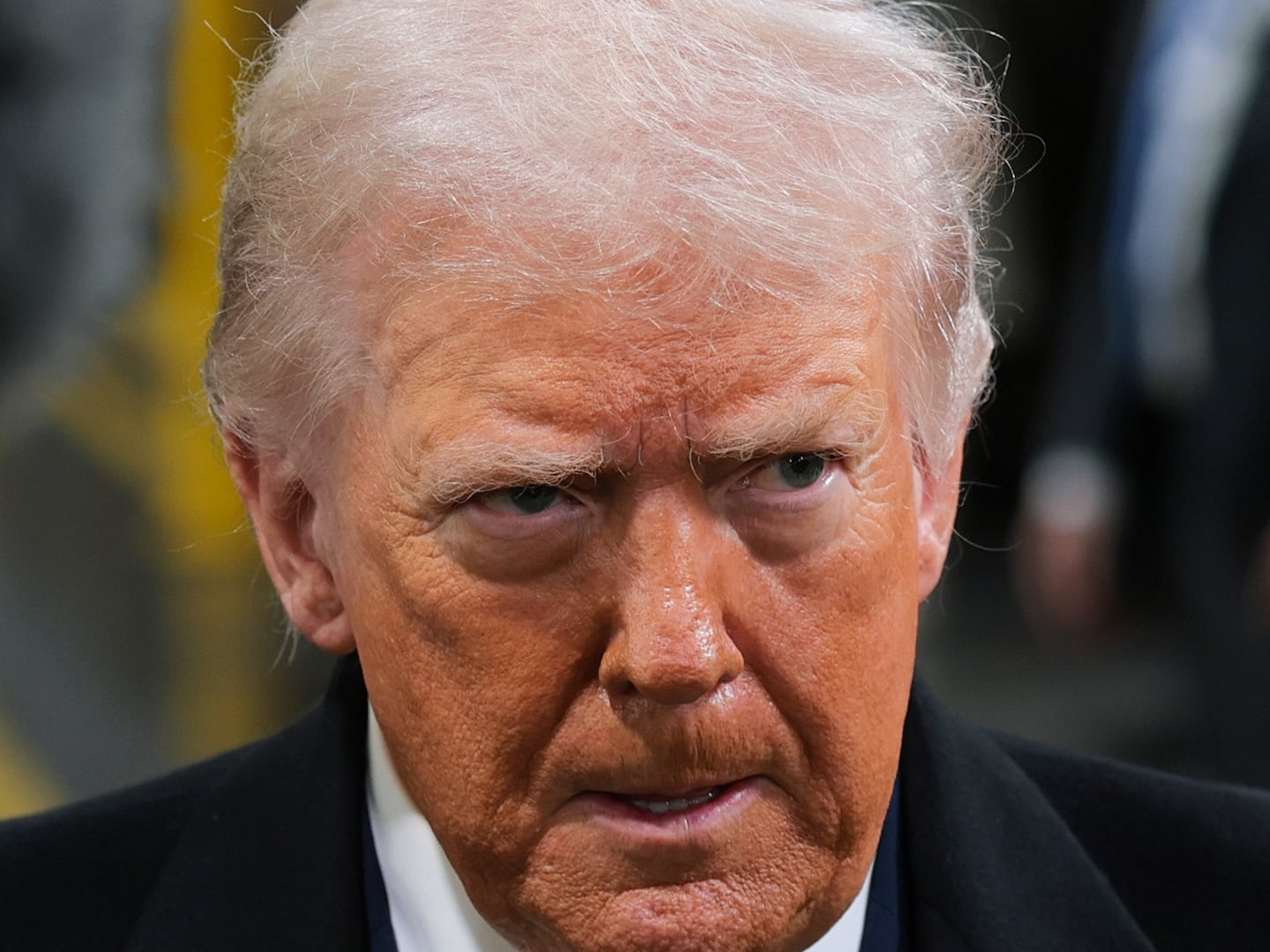
Joe Boswell quit his job at Camp David. But first, he played a tennis match with Michelle Obama. Her second chief of staff, Susan Sher, is an avid tennis fan, and Boswell, her assistant, was game for a doubles match. After a straight-sets victory, he leveled with the first lady of the United States. “I was tired of going through the motions,” he remembers. “She told me to go out and save the world and come back.”
“It’s cool to my family, or the girl that I meet at the bar, but in terms of day-to-day work—am I really doing the change we can believe in?” asked one Iowa veteran.
Today, Boswell isn’t so sure he’s coming back. The 25-year-old Dartmouth graduate served as one of a “dirty dozen” of young campaign fixers who roamed the country for President Barack Obama’s campaign. Yet, less than a year into the Obama administration, “I was bored,” he says. “I like to execute things; I like to get people empowered,” he adds. Despite helping to plant the first lady’s famous White House kitchen garden and holding playdates with the Obama daughters, “I knew it was time to go when I was falling asleep at meetings,” he said.
Boswell is not the only one looking for a change of scenery. Former Michigan field director Elizabeth Wilkins left her position at the Domestic Policy Council last week to attend Yale Law School. Longtime press assistant Priya Singh departed the beehive of the communications shop a month earlier to work with Ambassador Susan Rice at the United Nations. Her move came on the heels of the departure of Rice’s previous assistant—a young Harvard graduate more interested in journalism. Elizabeth Bafford, a key aide to budget director Peter Orszag, will attend Duke’s Fuqua School of Business this fall. Jake Levine, special assistant to climate adviser Carol Browner, is revisiting his decision to defer law school for the campaign life. His housemate, Eric Lesser, right-hand man to senior Obama adviser David Axelrod, is reportedly more interested in national-security issues. Yohannes Abraham left a job working under legislative affairs chief Phil Schiliro in order to become the national political director for Organizing for America.
The 18-month itch hits every administration—and some of these folks are heading for new jobs with their belief in Obama intact. But others are clearly suffering from "change" fatigue. And this presidency was supposed to be different. The young people working in the White House are supposed to be the truest of true believers. Countless postmortems attribute the Democratic Party’s 2008 success to a unique surge in “Barack the Vote” enthusiasm among 18- to 34-year olds. Many of these folks followed their political hero from the fields of Iowa into the White House—hoping to translate their dreams into policy, and build satisfying careers in the process.
A recent New York Times Magazine article focused on White House “twentysomethings” like Lesser, Levine, Jon Favreau, Reggie Love, and Samantha Tubman—and what they’re learning on the job. But as the campaign juggernaut settles into the grind of governing, many junior staff across the administration are heading for the exits, burned out and tired of life in the Obama bubble.
“Everyone, for better or worse, gets that it’s a special place to be,” says a former campaign staffer who worked in two federal agencies in Washington before leaving the government in March. “But the challenge is: What does it mean to ‘make it’”? One young graduate who left a plum job at the White House for more policy-related work at a federal agency explained the choice: “I can’t have the same job on my résumé for two and a half years. If I was going to stay, I needed to grow, and so I had to move.”
Of course, commuting to the most exclusive office building in America has its perks—and these privileged few are wary of whining at a time when so many of their peers are struggling just to find a job, any job. Toasting health care’s passage on the Truman Balcony of the White House, high-fiving members of the U.S. men’s soccer team, or sitting in on international climate negotiations are unforgettable memories. “You get to learn from the people that are making the decisions that affect the course of our country,” says Ross Weingarten, who recently left the Justice Department for a summer of service in Uganda. “For a young person, few experiences could be more educational, more exciting, or more fulfilling.”
Yet virtually all of the young White House and administration staffers I spoke to (most were unwilling to be named because of the sensitivity of their positions) have grown somewhat disillusioned—and say the glamour factor noted in the Times article is overblown. “It’s cool to my family, or the girl that I meet at the bar, but in terms of day-to-day work—am I really doing the change we can believe in?” asked one Iowa veteran. “Probably not. And it is very much of a shock.”
The central challenge for the twentysomethings is converting campaign skills into the realm of government. On the trail, “we got accustomed to marching orders: ‘You’re going to Iowa, you’re going to South Carolina, you’re going to New Hampshire,’” says the former agency staffer. “And in the real career world, you’re supposed to navigate this on your own.” For some of the wunderkind campaigners, who coordinated overseas trips, managed hundreds of volunteers, or oversaw multimillion-dollar budgets at Chicago headquarters, setting up the East Room for a bill signing, conducting West Wing tours or getting coffee for bull sessions in the Executive Office Building was a frustrating letdown. “We wanted change and we got it,” says Orrin Evans, who began working for Obama at the age of 21. “But we’re now hit with a new set of challenges.”
Of course, this White House is hardly the first to draft young and idealistic staffers, only to burn them out. “You become an adrenaline junkie and you don’t even know it,” says Heather Hurlburt, a White House and State Department speechwriter in her 20s during Bill Clinton’s administration. “People talk about first year Clinton as being a soccer team of preschoolers, where people just run for the ball—and there was a lot of fatigue and burnout and exhaustion as a result.”
Still, there is something poignant about the exodus among the “Yes, We Can” crowd. Key senior staffers such as Daniel Meltzer, Neera Tanden, Linda Douglass, and Sarah Feinberg have all left the White House in recent weeks, expressing a desire for a new direction—or relief from the punishing pace of the Executive Branch. The full-throttle Obama campaign—and the administration’s ambitious agenda since taking office—have clearly taken a toll. “We worked a 22-month campaign where you had to be perfect every single day… and now the stakes are even higher,” says the former agency staffer. “We all celebrated the inauguration, but the next day a lot of us went into work.”
Leaving Obamaland yields minor perks—Google’s popular email service is blocked at the White House—but also significant opportunities for advancement. The 24-year-old Abraham, for example, is suddenly helping to run the biggest grassroots mobilization effort in American politics to date.
Then there is the liberating impact of fleeing the bureaucracy. Just after the 2008 election, 26-year-old Facebook cofounder Chris Hughes explained his choice not to join the administration: “There was never any particular position or set of responsibilities that really excited me,” he said. “There’s a challenge in prioritization, there’s a challenge in working within constraints of the law, any political constraints that are there, to actually get good work done.”
“You can’t flip a switch and change the country,” adds Evans, now at the USDA. “We’re like a big, slow tanker—and I think a lot of folks are frustrated with that.”
There is also an achievement gap between more experienced staffers and those with only a BA to their name. Thirty-year-old Alejandra Campoverdi, also profiled in the Times, has a master's degree from Harvard’s Kennedy School and now serves as an aide to deputy chief of staff Mona Sutphen. Joshua Dubois, the 27-year-old director of the White House faith office, graduated from Princeton’s Woodrow Wilson School of Foreign Affairs. Jason Green, a 29-year-old associate in the Office of Legal Counsel, balanced previous campaign experience with a degree from Yale Law. But there is a ceiling for the younger staff.
“There is only one Dan Pfeiffer in all of Washington,” said one junior press aide contemplating law school, referring to the 35-year-old White House communications director. Some feel that to break into the power class, it’s important for them to catch up.
“A lot of folks have identified that [they] should actually know what [they're] talking about,” says Evans, “not just advocate what’s in my heart, but what works.”
So this summer, you’re just as likely to see Obama aides cruising GMAT or LSAT preparation classes as to find them playing on the STOTUS (Softball Team of the United States), shooting hoops at the Department of the Interior, or celebrating on the roof of Tabaq—a popular destination for birthday parties.
The restlessness may be the natural way of Washington, but stings more because of the campaign trail togetherness so many young staffers remember. The experience “was like the best preview in the world, the movie you want to see so badly,” says Boswell. “And then you see the movie and it’s mediocre.”
Dayo Olopade is a political reporter for The Daily Beast and a Bernard Schwartz Fellow at the New America Foundation.






